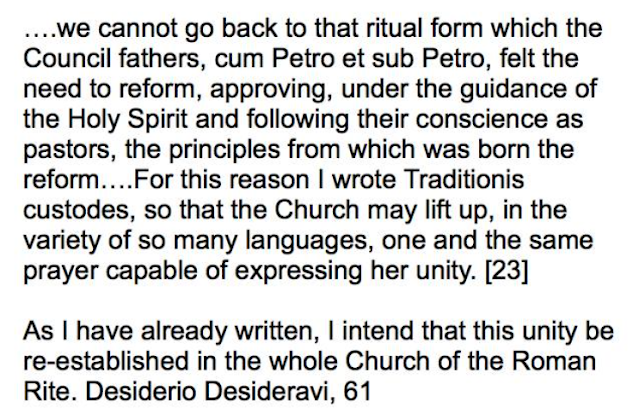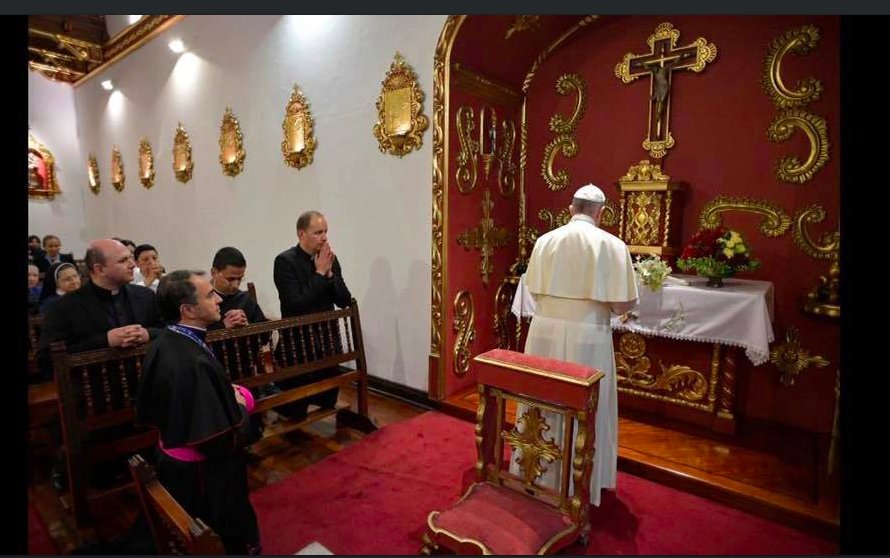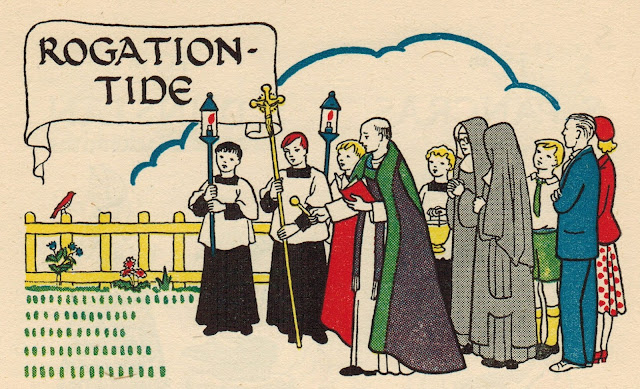For those reading the Office today according to the pre-Bugnini, pre-Pius XII/John XXIII destruction and well before the absurdly abbreviated and abridged Liturgy of the Hours, one will have noticed that it is a Rogation Day. (Note that this is not within the 1961 Office or 1962 Missal.)
If you are in Canada, it is a national holiday today celebrating Queen Victoria, so you have some to pray it.
What is a Rogation Day?
Here is the most comprehensive link, courtesy of FishEaters and the SSPX.
https://www.fisheaters.com/customseastertide3.html
http://sspx.org/en/news-events/news/beseeching-gods-favor-rogation-days-4137
Below is the Litany and Prayers for the Rogation.
Conclusion of Lauds
V. O Lord, hear my prayer.
R. And let my cry come unto thee.
V. Let us bless the Lord.
R. Thanks be to God.
Litany of the Saints
Lord, have mercy on us. Lord, have mercy on us.
Christ, have mercy on us. Christ, have mercy on us
Lord, have mercy on us. Lord, have mercy on us.
Christ, hear us.
Christ, graciously hear us.
God the Father of Heaven, have mercy on us.
God the Son, Redeemer of the world, have mercy on us.
God the Holy Spirit, have mercy on us.
Holy Trinity, one God, have mercy on us.
Holy Mary, pray for us.
Holy Mother of God, pray for us.
Holy Virgin of Virgins, pray for us.
St. Michael, pray for us.
All holy Angels and Archangels, pray for us.
All holy orders of blessed spirits, pray for us.
St. John the Baptist, pray for us.
St. Joseph, pray for us.
All holy Patriarchs and Prophets, pray for us.
St. Peter, pray for us.
St. Paul, pray for us.
St. Andrew, pray for us.
St. James, pray for us.
St. John, pray for us.
St. Thomas, pray for us.
St. James, pray for us.
St. Philip, pray for us.
St. Bartholomew, pray for us.
St. Matthew, pray for us.
St. Simon, pray for us.
St. Thaddeus, pray for us.
St. Matthias, pray for us.
St. Barnabas, pray for us.
St. Luke, pray for us.
St. Mark, pray for us.
All holy Apostles and Evangelists, pray for us.
All holy Disciples of the Lord, pray for us.
All Holy Innocents, pray for us.
St. Stephen, pray for us.
St. Lawrence, pray for us.
St. Vincent, pray for us.
SS. Fabian and Sebastian, pray for us.
SS. John and Paul, pray for us.
SS. Cosmas and Damian, pray for us.
SS. Gervase and Protase, pray for us.
All holy Martyrs, pray for us.
St. Sylvester, pray for us.
St. Gregory, pray for us.
St. Ambrose, pray for us.
St. Augustine, pray for us.
St. Jerome, pray for us.
St. Martin, pray for us.
St. Nicholas, pray for us.
All holy Bishops and Confessors, pray for us.
All holy Doctors, pray for us.
St. Anthony, pray for us.
St. Benedict, pray for us.
St. Bernard, pray for us.
St. Dominic, pray for us.
St. Francis, pray for us.
All holy Priests and Levites, pray for us.
All holy Monks and Hermits, pray for us.
St. Mary Magdalen, pray for us.
St. Agatha, pray for us.
St. Lucy, pray for us.
St. Agnes, pray for us.
St. Cecilia, pray for us.
St. Catherine, pray for us.
St. Anastasia, pray for us.
All holy Virgins and Widows, pray for us.
All holy Saints of God, intercede for us.
Be merciful, Spare us, O Lord.
Be merciful, Hear us, O Lord.
From all evil, Spare us, O Lord.
From all sin, Spare us, O Lord.
From thy anger, Spare us, O Lord
From a sudden and unprovided death, Spare us, O Lord.
From the snares of the devil, Spare us, O Lord.
From anger, and hatred, and every evil will, Spare us, O Lord.
From the spirit of fornication, Spare us, O Lord.
From lightning and storms, Spare us, O Lord.
From the scourge of earthquake, Spare us, O Lord.
From plague, famine, and war, Spare us, O Lord.
From everlasting death, Spare us, O Lord.
Through the mystery of thy holy Incarnation, Spare us, O Lord.
Through thy Coming, Spare us, O Lord.
Through thy Birth, Spare us, O Lord.
Through thy Baptism and holy Fasting, Spare us, O Lord.
Through thy Cross and Passion, Spare us, O Lord.
Through thy Death and Burial, Spare us, O Lord.
Through thy holy Resurrection, Spare us, O Lord.
Through thy admirable Ascension, Spare us, O Lord.
Through the coming of the Holy Spirit, the Paraclete, Spare us, O Lord.
In the day of Judgment, Spare us, O Lord.
We sinners, We beg of thee, hear us.
That thou wouldst spare us, We beg of thee, hear us.
That thou wouldst pardon us, We beg of thee, hear us.
That thou wouldst kindly bring us to true penance, We beg of thee, hear us.
That thou wouldst kindly govern and preserve thy holy Church, We beg of thee,
hear us.
That thou wouldst kindly preserve in holy religion the Pope and all clerics in
holy orders, We beg of thee, hear us.
That thou wouldst kindly humble the enemies of holy Church, We beg of thee,
hear us.
That thou wouldst kindly give peace and true concord to Christian kings and
princes, We beg of thee, hear us.
That thou wouldst kindly grant peace and unity to the whole Christian world, We
beg of thee, hear us.
That thou wouldst restore to the unity of the Church all who have strayed from
the truth and lead all infidels to the light of the Gospel, We beg of thee,
hear us.
That thou wouldst kindly confirm and preserve us in thy holy service, We beg of
thee, hear us.
That thou wouldst kindly lift up our minds to heavenly desires, We beg of thee,
hear us.
That thou wouldst kindly give eternal blessings to all our benefactors, We beg
of thee, hear us.
That thou wouldst kindly deliver our souls, and the souls of our brethren,
relations, and benefactors from eternal damnation, We beg of thee, hear us.
That thou wouldst kindly give and preserve the fruits of the earth, We beg of
thee, hear us.
That thou wouldst kindly grant eternal rest to all the faithful departed, We
beg of thee, hear us.
That thou wouldst be so kind as to answer our prayers Son of God, We beg of
thee, hear us.
Lamb of God, who takest away the sins of the world, spare us, O Lord.
Lamb of God, who takest away the sins of the world, graciously hear us, O Lord.
Lamb of God, who takest away the sins of the world, have mercy on us.
Christ, hear us,
Christ, graciously hear us.
Lord, have mercy on us. Lord, have mercy on us.
Christ, have mercy on us. Christ, have mercy on us.
Lord, have mercy on us.Lord, have mercy on us.
Our Father, who art in heaven, Hallowed be thy name. Thy kingdom
come. Thy will be done on earth as it is in heaven. Give us this day our daily
bread. And forgive us our trespasses, as we forgive those who trespass against
us.
V. And lead us not into temptation:
R. But deliver us from evil.
Psalm 69
(Unto the end, a psalm for David, to bring to remembrance that the Lord
saved him.)
O God, come to my assistance; O Lord, make haste to help me.
Let them be confounded and ashamed that seek my soul:
Let them be turned backward, and blush for shame that desire evils to me: Let
them be presently turned away blushing for shame that say to me: Tis well, tis
well.
Let all that seek thee rejoice and be glad in thee; and let such as love thy
salvation say always: The Lord be magnified.
But I am needy and poor; O God, help me. Thou art my helper and my deliverer: O
Lord, make no delay.
V. Glory be to the Father, and to the Son, * and to the Holy Ghost.
R. As it was in the beginning, is now, * and ever shall be, world
without end. Amen.
V. Save thy servants.
R. Who hope in thee, O God.
V. Be to us, O Lord, a tower of strength.
R. Against the power of the enemy.
V. Let not the enemy prevail against us.
R. Nor the son of evil have power to hurt us.
V. Lord, deal not with us according to our sins.
R. Nor requite us according to our evil doings.
V. Let us pray for our Sovereign Pontiff N.
R. The Lord watch over him and give him life and happiness on
earth, and deliver him not to the will of his enemies.
V. Let us pray for our benefactors.
R. Be so kind, O Lord, as to give eternal life to all those who do
us good, for thy name's sake. Amen.
V. Let us pray for the faithful departed.
R. Eternal rest give unto them, O Lord, and let perpetual light
shine upon them.
V. May they rest in peace.
R. Amen.
V. For our brethren who are not with us.
R. Save thy servants who put their trust in thee, O God.
V. Send them help, O Lord, from thy holy place.
R. And from Sion protect them.
V. O Lord, hear my prayer.
R. And let my cry come unto you.
secunda Domine exaudi omittitur
Prayer
Let us pray.
O God, it is according to thy nature always to show mercy
and forgiveness.
Receive our petition that we and all thy servants, bound by the chains of sin,
may, by thy tender mercy, be pardoned.
We beg thee, O Lord, hear our prayers as we kneel before thee.
Pardon our sins, as we confess them to thee, so that thou mayest, in thy kindness,
give us pardon as well as peace.
In thy kindness show us, O Lord, thy unutterable mercy, and at
one and the same time free us from all our sins, and snatch us away from the
punishment which we deserve for them.
O God, thou art offended by sin, and placated by penance.
Look with favor upon the prayers of thy people kneeling before thee. Turn away
the scourges of thine anger which we have deserved for our sins.
Almighty, everlasting God, have mercy on thy servant N.,
our Sovereign Pontiff. Direct him, according to thy mercy into the path of
eternal salvation so that, by thy grace, he may both desire those things that
are pleasing to thee, and may perform them with all his strength.
O God, from whom all holy desires, all good counsels, and
all just works do proceed; Give unto thy servants that peace which the world
cannot give, so that, with our hearts set to obey thy commandments, and freed
from the fear of the enemy, we may pass our lives in peace under thy
protection.
Inflame our hearts and our desires, O Lord, with the fire of the
Holy Spirit, so that we may serve thee with a chaste body, and please thee with
a pure heart.
O God, thou art the creator and redeemer of all the
faithful. Grant to the souls of thy servants departed the remission of all their
sins, so that by our faithful prayers they may obtain the pardon they have
always desired.
We beg thee, O Lord, to direct our actions by thy holy
inspiration, and carry them forward by thy gracious assistance, so that every
prayer and work of ours may always begin with thee, and, begun through thee, be
happily ended.
Almighty and everlasting God, who hast dominion over the living
and the dead and who art merciful to all whom thou foreknowest shall be thine
by faith and good works, we humbly beg of thee, that they for whom we have
intended to pour out our prayers, whether this present world still detains them
in the flesh, or whether the world to come has already received them out of
their bodies, may, through the prayers of all thy saints, by thy merciful
goodness obtain the remission of all their sins
Through Jesus Christ, thy Son our Lord, Who liveth and reigneth
with thee, in the unity of the Holy Ghost, ever one God, world without end.
R. Amen.
V. O Lord, hear my prayer.
R. And let my cry come unto thee.
V. May the almighty and merciful Lord graciously hear us.
R. Amen.
V. May the souls of the faithful, through the mercy of God, rest in
peace.
R. Amen.




.jpg)




